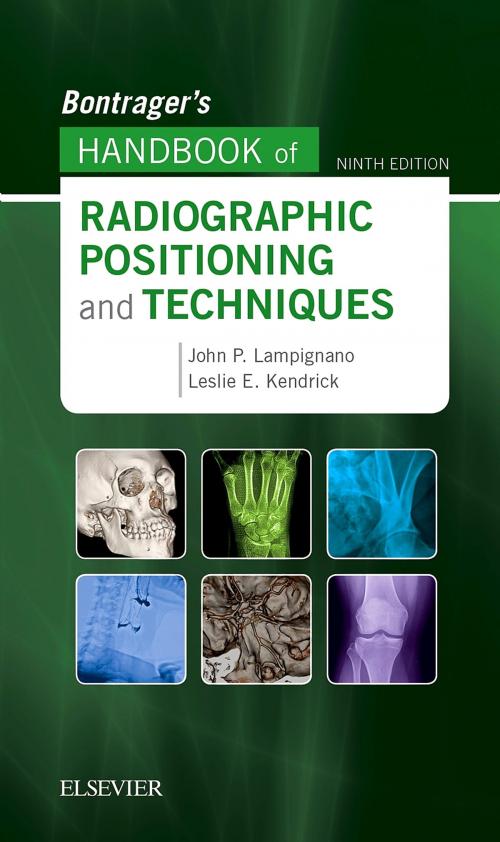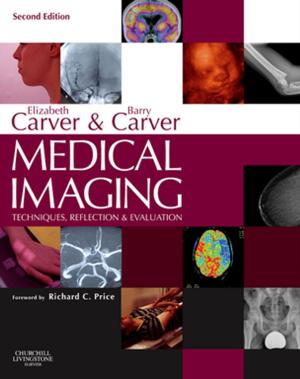Bontrager's Handbook of Radiographic Positioning and Techniques - E-BOOK
Nonfiction, Health & Well Being, Medical, Allied Health Services, Radiological & Ultrasound| Author: | Kenneth L. Bontrager, MA, RT(R), John Lampignano, MEd, RT(R) (CT) | ISBN: | 9780323510929 |
| Publisher: | Elsevier Health Sciences | Publication: | February 10, 2017 |
| Imprint: | Mosby | Language: | English |
| Author: | Kenneth L. Bontrager, MA, RT(R), John Lampignano, MEd, RT(R) (CT) |
| ISBN: | 9780323510929 |
| Publisher: | Elsevier Health Sciences |
| Publication: | February 10, 2017 |
| Imprint: | Mosby |
| Language: | English |
This pocket-sized Handbook for Lampignano and Kendrick’s text has it all: new radiographic images, revised critiques, and more. Bontrager’s Handbook of Radiographic Positioning and Techniques, 9th Edition provides bulleted instructions, along with photos of properly positioned patients, to help you safely and confidently position for the most-commonly requested radiographic studies. Suggested techniques and critique points offer a quick reference for evaluating your own radiographs, making it an invaluable tool for learning radiographic positioning in clinical settings.
-
Positioning chapters organized with one projection per page to present a snapshot of information in an easily accessible and portable format.
-
Unique page layout — positioning photos and radiographic images are presented on the same page with the text explanation of each procedure — to show you how the patient should be positioned and what the image should look like.
-
Page number references for the text are included at the bottom of each positioning page so you can easily refer to the text for greater detail and explanation concerning a particular position.
-
217 projections/positions and 4 conversion charts provide the essential information needed for quick reference.
-
Positioning presentations include positioning instructions, as well as:
-
Collimation guidelines for each projection.
Suggested starting exposure factors, including kVp, mAs, SID (source-image receptor distance), type and speed of film and screens, use of grids, and large or small focal spot.
Suggested AEC (automatic exposure control) pick-up cell location when photo-timed equipment can be used.
Space for writing in exposure factors (techniques) for specific equipment being used.
This quick review of information before beginning a procedure helps assure you that the exam is being correctly performed with the least possible patient dose.
-
Appendices offer additional quick-reference information on patient dose, abbreviations and acronyms, and various conversion charts, enabling you to locate important information quickly.
-
NEW! Technique chart updates reflect the latest recommendations for computed and digital radiography.
-
UPDATED! New positioning photos reflect the latest equipment and demonstrate proper positioning.
-
UPDATED! New radiographic images and revised critiques provide examples using the latest technology, and ensure that you are ready to evaluate your own images.
-
EXPANDED! New position added on Apical AP axial give you information and photographs on this position.
This pocket-sized Handbook for Lampignano and Kendrick’s text has it all: new radiographic images, revised critiques, and more. Bontrager’s Handbook of Radiographic Positioning and Techniques, 9th Edition provides bulleted instructions, along with photos of properly positioned patients, to help you safely and confidently position for the most-commonly requested radiographic studies. Suggested techniques and critique points offer a quick reference for evaluating your own radiographs, making it an invaluable tool for learning radiographic positioning in clinical settings.
-
Positioning chapters organized with one projection per page to present a snapshot of information in an easily accessible and portable format.
-
Unique page layout — positioning photos and radiographic images are presented on the same page with the text explanation of each procedure — to show you how the patient should be positioned and what the image should look like.
-
Page number references for the text are included at the bottom of each positioning page so you can easily refer to the text for greater detail and explanation concerning a particular position.
-
217 projections/positions and 4 conversion charts provide the essential information needed for quick reference.
-
Positioning presentations include positioning instructions, as well as:
-
Collimation guidelines for each projection.
Suggested starting exposure factors, including kVp, mAs, SID (source-image receptor distance), type and speed of film and screens, use of grids, and large or small focal spot.
Suggested AEC (automatic exposure control) pick-up cell location when photo-timed equipment can be used.
Space for writing in exposure factors (techniques) for specific equipment being used.
This quick review of information before beginning a procedure helps assure you that the exam is being correctly performed with the least possible patient dose.
-
Appendices offer additional quick-reference information on patient dose, abbreviations and acronyms, and various conversion charts, enabling you to locate important information quickly.
-
NEW! Technique chart updates reflect the latest recommendations for computed and digital radiography.
-
UPDATED! New positioning photos reflect the latest equipment and demonstrate proper positioning.
-
UPDATED! New radiographic images and revised critiques provide examples using the latest technology, and ensure that you are ready to evaluate your own images.
-
EXPANDED! New position added on Apical AP axial give you information and photographs on this position.















